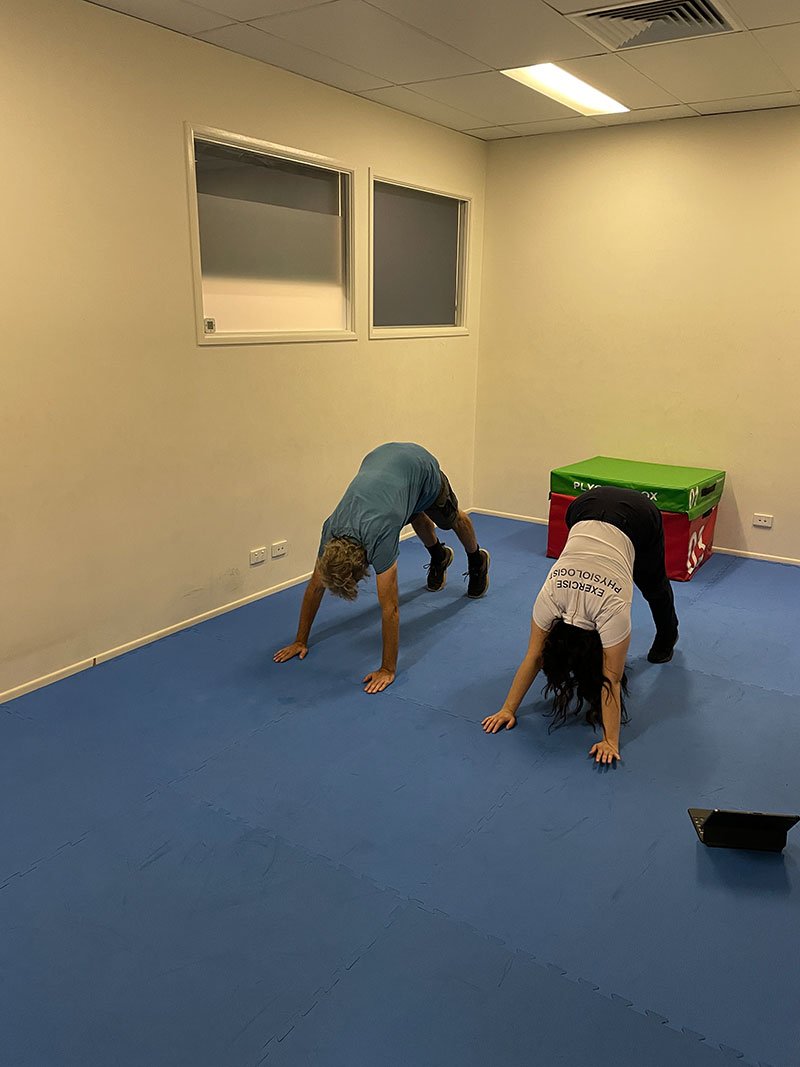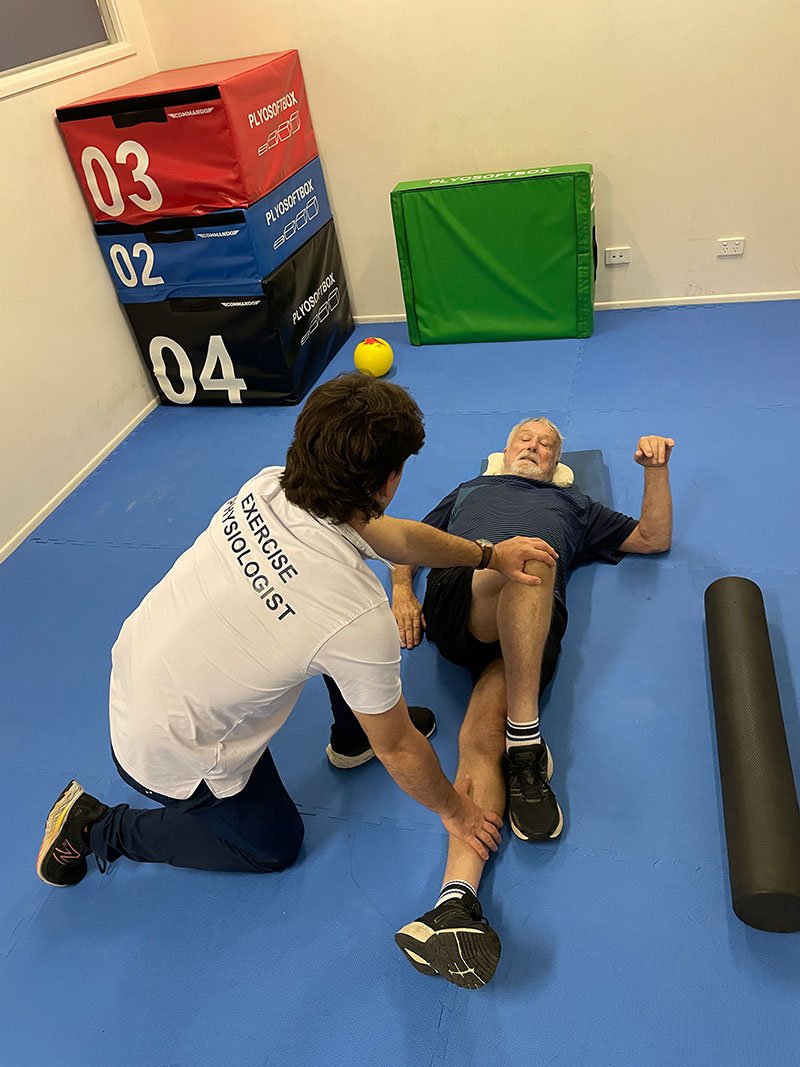Exercise Physiology: Enhance Your Health and Fitness

Struggling with chronic pain, limited mobility, or post-operative recovery? You're not alone, and there’s hope for relief and improvement.
About Exercise Physiology
At The Allied Health Team, we are dedicated to providing tailored solutions that address these issues effectively. With our Exercise Physiology, you’ll boost performance, prevent injuries, and speed up recovery. Our exercise physiology service involves:
Personalised Exercise Plans
Chronic Disease Management
Injury Rehabilitation
Pain Management
Cardiorespiratory Fitness Improvement
Functional Strength Training
Our expert exercise physiology services are designed to resolve your health concerns and improve your quality of life. Whether you're recovering from an injury, managing a chronic condition, or simply aiming to improve your overall fitness, our approach ensures you receive the most effective and personalised care. Choose us for a healthier, more vibrant life.
We offer convenient home visits in the suburbs listed in the ‘Locations’ section above. For in-clinic appointments, our main clinic is located in Bokarina.
Ready to enhance your health with professional Exercise Physiology ? Call us at 0455 055 721 or visit our Contact Us page to get started.



Our Professional Exercise Physiology Support
At The Allied Health Team, we provide an array of exercise physiology services designed to meet your health and wellness needs. From chronic disease management to fitness improvements, our offerings are tailored to foster optimal health outcomes.
-
Develop a fitness routine that's as unique as you are with our personalised exercise plans. We assess your fitness level, health goals, and personal preferences to craft a regimen that not only suits your lifestyle but also propels you towards your health objectives efficiently.
-
Navigate the complexities of managing chronic diseases with our expert guidance. Our exercise physiologists design programs that help mitigate symptoms and improve life quality, focusing on enhancing physical capacity and reducing the impact of chronic conditions.
-
Recover and regain strength with our targeted injury rehabilitation services. We use evidence-based techniques to accelerate your recovery, reduce pain, and restore function. This approach helps ensure you return to your daily activities as safely and quickly as possible.
-
Alleviate chronic and acute pain through our comprehensive pain management strategies. By integrating exercise therapy and lifestyle modifications, we help reduce your dependence on medication and enhance your overall well-being.
-
Boost your heart and lung health with our cardiorespiratory fitness improvement programs. Tailored to your current fitness level, these plans enhance endurance, increase stamina, and improve overall health, helping you breathe easier and perform better.
-
Enhance your body's ability to handle real-life movements with functional strength training. Our programs focus on building strength that matters, improving muscle function, and increasing mobility to keep you active and injury-free.
Why Exercise Physiology is Essential for Your Health
Curious about how our Exercise Physiology services can help you? Here’s how:
Enhanced Physical Fitness: Tailored exercises increase strength, endurance, and flexibility, contributing to overall physical health.
Chronic Condition Management: Exercise physiology plays a crucial role in managing conditions like diabetes, heart disease, and arthritis, improving quality of life.
Mental Health Improvements: Regular physical activity reduces symptoms of depression and anxiety, which helps boost mental well-being.
Injury Prevention and Recovery: Proper exercise reduces the risk of injury and accelerates recovery times.
Longevity and Ageing Well: Maintain your health and activity levels as you age with routines designed for your evolving needs.
Improved Mobility and Functionality: Targeted exercises improve daily functioning and independence, especially important for those with physical limitations.
Who Should Take Our Exercise Physiology Services in?
Our Exercise Physiology services are designed for individuals who need expert guidance to improve their health through exercise. If you fall into any of the following categories, our services can help enhance your quality of life:
Seniors: Tailored programs help maintain independence and manage age-related health issues.
Veterans: Specialised therapeutic exercises address both physical and mental health challenges specific to veterans.
Individuals with Disabilities: Adaptive exercises improve mobility, strength, and daily functionality.
People with Chronic Diseases: Exercise plans are crafted to help manage symptoms and improve overall health.
Individuals Returning to Work: Rehabilitation exercises ensure a safe and efficient return to work after injury or illness.
How to Access Our Exercise Physiology Services
Accessing our Exercise Physiology services is straightforward and inclusive, catering to various funding situations to ensure everyone can benefit:
Home Care Packages: Utilise your Home Care Package for ongoing, personalised exercise plans that cater to seniors living at home. Learn more about our Home Care Package Exercise Physiology services
DVA (Department of Veterans' Affairs): Veterans can access our services through DVA funding, which ensures long-term health support. Learn more about our DVA Exercise Physiology services
NDIS (National Disability Insurance Scheme): Individuals with disabilities can use NDIS funding for sustainable exercise physiology services tailored to their needs. Learn more about our NDIS Exercise Physiology services
These government-funded methods allow for long-term engagement, reducing your costs and significantly enhancing your health outcomes with us.
Why Choose The Allied Health Team for Exercise Physiology
Choose The Allied Health Team for unparalleled expertise in exercise physiology. Here's why we stand out:
100% Satisfaction Guarantee: We're committed to your health and happiness. If you're not satisfied, neither are we.
Personal Attention: Our one-on-one consultations ensure that you have our undivided attention, helping you achieve the best outcomes.
Daily Quality Discussions: Our team meets daily to discuss and enhance our quality of care, ensuring every client receives the ideal treatment plan.
Evidence-Based Practices: We utilise the latest research and methods to tailor our exercise prescriptions and ensure effective and safe outcomes.
Comprehensive Health Evaluations: Each client undergoes a detailed assessment to tailor our approach to your specific needs and goals.
Continuous Support: Our team provides ongoing support and adjustments to your plan, ensuring it evolves with your progress and health changes.
Start Your Wellness Journey with Exercise Physiology Today!
Take the first step towards a healthier you with The Allied Health Team. Call us at 0455 055 721 or visit our Contact Us page to schedule your consultation. Our team is ready to support you in achieving your health goals with personalised, effective exercise physiology services.
Frequently Asked Questions
-
An exercise physiologist is a university-qualified allied health professional specialising in the delivery of exercise, lifestyle, and behavioural modification programs for the prevention and management of chronic diseases and injuries. Learn more about why you should see an exercise physiologist
-
Our exercise physiologists can help you improve your strength, balance, mobility, and overall fitness. We can also design programs to manage chronic conditions, reduce your risk of falls, and improve your quality of life. Discover the benefits of exercise physiology and how it can improve your health
-
The recommended frequency of exercise will depend on your individual needs and goals. Your exercise physiologist will work with you to develop a schedule that fits your lifestyle and preferences.
-
Yes, we offer convenient home visits to make it easy for you to access our Exercise Physiology services.
-
Exercise physiology and dietetics are complementary disciplines that can synergistically improve your health and well-being. Exercise physiologists focus on the role of physical activity in promoting health, while dietitians specialise in nutrition and the impact of food on the body. By combining both, you can achieve optimal results through a holistic approach that addresses both exercise and nutrition. This may involve tailoring your exercise program to complement your dietary needs, or adjusting your diet to support your exercise goals. Together, these two professions can help you achieve optimal health outcomes, whether you're managing a chronic condition, recovering from an injury, or simply aiming to improve your overall well-being.
-
Both exercise physiologists and physiotherapists play crucial roles in improving health and well-being, but their approaches differ. Physiotherapists are experts in diagnosing and treating injuries and movement disorders, often using manual therapy techniques like massage and joint manipulation.
Exercise physiologists, on the other hand, focus on developing personalised exercise programs to prevent and manage chronic diseases, improve fitness, and rehabilitate injuries. While there can be some overlap, physiotherapists are typically more hands-on in their approach, while exercise physiologists primarily use exercise as their therapeutic tool. Understand the key differences between exercise physiology and physiotherapy -
Of course you can! :)
Partner, family member, friend, carer, you name it. The majority of the time we want to incorporate a socialising aspect when exercising. Providing this person will encourage and motivate you, bring them along -
No, exercise physiologists do not perform hands-on manipulation like massage or joint mobilisation. Their primary focus is on developing and implementing safe and effective exercise programs tailored to individual needs and goals. However, they may incorporate stretching and other forms of movement into your program to improve flexibility and range of motion.
-
Occupational therapists focus on helping people participate in daily activities and meaningful occupations. They assess and address barriers that may prevent individuals from engaging in tasks related to work, self-care, or leisure.
Exercise physiologists, while they can also address functional limitations, primarily use exercise as a means to improve health and well-being, focusing on physiological adaptations and fitness improvements. -
Osteopaths are holistic practitioners who use manual therapy techniques to address musculoskeletal issues and promote overall health. They believe in the body's ability to heal itself and focus on improving joint mobility and function.
Exercise physiologists, while they may address musculoskeletal issues through exercise, primarily focus on using exercise as a therapeutic tool to improve fitness, manage chronic diseases, and enhance overall well-being. -
While both exercise physiologists and personal trainers design exercise programs, their qualifications and scope of practice differ. Exercise physiologists have university degrees in exercise science or a related field and specialise in working with individuals with specific health conditions or needs.
Personal trainers typically have certifications focused on fitness and may not have the same level of expertise in working with complex medical conditions or disabilities. See why exercise physiology is more comprehensive than personal training



